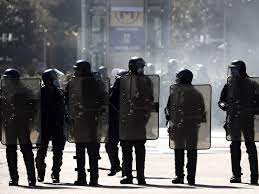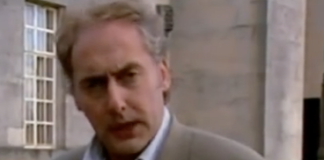- Opposites attract - 26th February 2026
- Upset coffee - 25th February 2026
- Not acting the part - 24th February 2026

During 23 years with the BBC, and 39 years as a journalist (when he was trained to use clear and simple language, avoiding jargon), violence was often threatened against our Editor, Welshman Phil Parry, and this has now been put centre stage by enormous controversy over the force used by French police to put down country-wide protests against pension reforms.
Earlier he described how he was assisted in breaking into the South Wales Echo (SWE) office car when he was a cub reporter, recalled his early career as a journalist, the importance of experience in the job, and making clear that the‘calls’ to emergency services as well as court cases are central to any media operation.
 He has also explored how poorly paid most journalism is when trainee reporters had to live in squalid flats, the vital role of expenses, and about one of his most important stories on the now-scrapped 53 year-old BBC Wales TV Current Affairs series, Week In Week Out (WIWO), which won an award even after it was axed, long after his career really took off.
He has also explored how poorly paid most journalism is when trainee reporters had to live in squalid flats, the vital role of expenses, and about one of his most important stories on the now-scrapped 53 year-old BBC Wales TV Current Affairs series, Week In Week Out (WIWO), which won an award even after it was axed, long after his career really took off.
Phil has explained too how crucial it is actually to speak to people, the virtue of speed as well as accuracy, why knowledge of ‘history’ is vital, how certain material was removed from TV Current Affairs programmes when secret cameras had to be used, and some of those he has interviewed.
He has disclosed as well why investigative journalism is needed now more than ever although others have different opinions, how the coronavirus (Covid-19) lockdown played havoc with media schedules, and the importance of the hugely lower average age of some political leaders compared with when he started reporting.

Thankfully it was usually the camera crew that used to get it, NOT ME!
I had learned to step back when I was doorstepping somebody for the BBC Cymru Wales (BBC CW) Current Affairs series Week In, Week Out (WIWO) which I presented for 10 years.
I remember on one occasion the subject grabbed our sound man’s microphone, and we had to give a police interview for a charge of stolen property!
Yet the threat of violence against me personally was ever-present, and people often used to storm out of interviews because they became so angry at my questions.
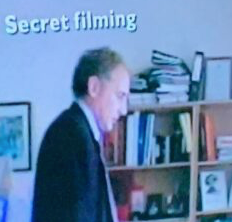 I have visited one individual at home who I was effectively accusing of murder, with the door I came through being bolted behind me, when, looking back, there was an enormous risk of violence.
I have visited one individual at home who I was effectively accusing of murder, with the door I came through being bolted behind me, when, looking back, there was an enormous risk of violence.
During filming for this programme, executives paid to have my house wired for intruders, with panic buttons installed at the bedside and in the hall.
This action completely freaked out my wife who was alone with our two small children!


They also hired a security expert to come to Cardiff and give me advice on keeping my movements irregular in case I was followed, because, apparently, it is very important NOT to keep to a regular routine.
This wasn’t for WIWO, it happened during filming for a BBC Panorama programme about the awful Clydach Murders four years after they happened, when four members of the same family were beaten to death, and their house set on fire. It was a precursor to Sky documentary films about the extraordinary case called ‘Murder in the Valleys’ (MITV).
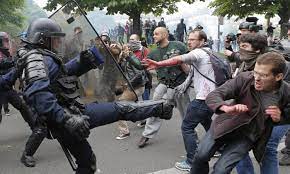
My Editor at the time kindly said I was the bravest journalist he knew.
All of this has come to the forefront of my mind, with news about the growing controversy over the use of extreme violence by the French police in putting down huge protests against Emmanuel Macron’s pension reforms.
Europe’s leading human rights watchdog accused the French police of employing “excessive force” against the demonstrators.

Dunja Mijatovic, the Council of Europe’s human rights commissioner, said those wishing to gather peacefully had a right to be protected from “police brutality” and attacks by protesters against officers did not justify the heavy-handed response we have seen.
She called on France to respect the right to protest, and described the situation as “worrying”, saying in a statement: “Violent incidents have occurred, some of which have targeted the forces of law and order. But sporadic acts of violence by some demonstrators or other reprehensible acts committed by others during a protest cannot justify excessive use of force by agents of the state”.
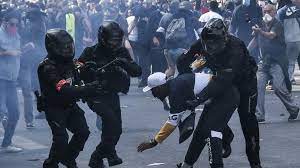
The police have been accused of making arbitrary arrests and using unnecessary force when dealing with the opponents to the reform, who are angry that it will raise the retirement age from 62 to 64.
Demonstrations across the country have been mostly peaceful, but when the police arrived they have degenerated into violent clashes, with the destruction of public or private buildings as well as other property.
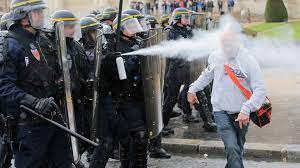
Hundreds of people have been arrested and detained, but the majority were subsequently released without charges. Human rights advocates and demonstrators have been clubbed or tear-gassed.
A man in one Paris protest march lost a testicle to an officer’s club, and a police grenade took the thumb of a woman in Rouen. A railroad worker hit by grenade fragments lost an eye.
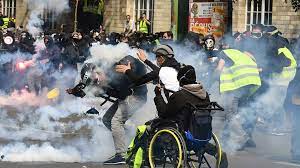
“Where is your humanity?” a woman shouted at officers who knocked an apparently homeless man to the ground in Paris, kicking him and using vulgar language while ordering him to get up and go.
A video posted on Twitter showed another passerby helping the man to his feet in the scene near the Place de la Bastille.
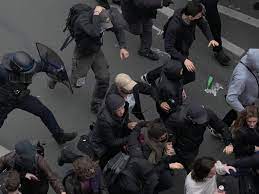
Yet the violence from the police in France was counter-productive, and has only added to anger in the streets as well as complicating efforts to invite dialogue between the government and labour unions.
This, however, has been REAL violence, and nothing like what I have faced…
Details like these, and including the threats borne by Phil, as he was gripped by the rare neurological condition Hereditary Spastic Paraplegia (HSP), have been released in a major book ‘A GOOD STORY’. Order it now!

Regrettably publication of another book, however, was refused, because it was to have included names.








